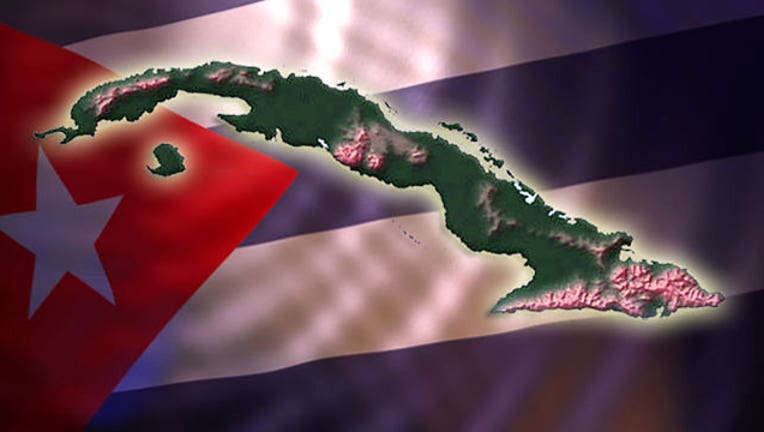Cheered in Havana, Obama's Cuba trip spurs GOP skepticism

WASHINGTON (AP) — President Barack Obama's plans for a history-making trip to Cuba drew hopeful cheers in Havana on Thursday but equally emphatic condemnation from many U.S. lawmakers and Republican presidential candidates, who accused the president of rewarding a "dictatorial regime."
Jeb Bush called the plans "appalling." Florida Rep. Ileana Ros-Lehtinen, born in Havana, deemed Obama's March 21-22 visit "absolutely shameful." New Jersey Sen. Bob Menendez — a member of Obama's party — accused him of ceding U.S. leverage to the communist nation 90 miles south of Florida.
"The president is again prioritizing short-term economic interests over long-term and enduring American values," said Menendez, another Cuban-American. He likened Obama's rapprochement with Cuba to his nuclear deal with Iran.
Not so, said Obama, who pledged to press President Raul Castro on human rights and other thorny issues during their sit-down in the Cuban capital. The White House said pointedly that it had put Castro's government on notice that Obama would also meet with dissidents and activists —a precondition the president had laid out for a visit.
"We still have differences with the Cuban government that I will raise directly," Obama said as he announced the visit on Twitter.
The trip will mark a watershed moment in U.S.-Cuba relations, making Obama the first sitting U.S. president to set foot on the island in nearly seven decades. The U.S. was estranged from the communist nation for over half a century until Obama and Castro moved toward detente more than a year ago.
Since then, the nations have reopened embassies in Washington and Havana and moved to restore commercial flights, with a presidential visit seen as a key next step.
Yosvany Martinez, a 36-year-old government parking attendant in Havana, said he'd seen changes in his country since the thaw in relations: more tourism and happier people. But Cubans are still struggling economically, he said.
"This visit for me and for all Cubans will be an open door to what we need, which is that they finally lift the blockade, which is what hurts us," Martinez said.
Obama hopes to persuade Congress to lift the trade embargo — Havana's biggest request of the U.S. Although short-term prospects have seemed unlikely, some Republicans have suggested Congress could pass legislation repealing sanctions by year's end.
Cuban Foreign Trade Minister Rodrigo Malmierca, in Washington for business talks, told The Associated Press that Obama's visit will be good news for his country.
"The president will be welcomed," he said in Spanish.
Though Obama sees the re-launch with Cuba as a major achievement of his foreign policy, he's had to strike a careful balance to defend engaging with a communist government that still is seen as stifling political opposition and restricting free speech.
The White House pointed to Cuba's recent release of long-term political prisoners, expansion of Internet hotspots and easing of restrictions on private business. On the economic front, the two nations signed a deal this week on commercial air traffic, and the U.S. approved its first factory in Cuba since 1959, when Fidel Castro took power and nationalized billions in American property.
Still, Obama's advisers said the U.S. isn't satisfied with Cuba's human rights approach, citing a rise in short-term detentions as one example.
Obama has argued that the long U.S. effort to put an economic squeeze on Cuba has failed to advance U.S. interests. Engaging the former Cold War foe offers better prospects for reform, Obama and supporters of the policy change maintain.
"For Cubans accustomed to watching their government sputter down the last mile of socialism in a '57 Chevy, imagine what they'll think when they see Air Force One," said Sen. Jeff Flake, an Arizona Republican and one of Obama's closest allies on Cuba. Last year Flake traveled to Havana with Secretary of State John Kerry as the American flag was raised over the re-opened U.S. Embassy.
Castro's government offered no details about preparations, though it typically marshals thousands of police and soldiers for any major state visit to maintain control and order on the streets. The logistics will require some creativity as the White House sends the president and his massive entourage into a country with sketchy Internet and limited connectivity for U.S. cellphones.
From Cuba, Obama will travel to Argentina, where he'll meet with new President Mauricio Macri.
Texas Sen. Ted Cruz, whose father came to the U.S. from Cuba, said Obama shouldn't visit while the Castro family remains in power. Told of Obama's trip, Florida Sen. Marco Rubio quipped that Obama is "probably not going to invite me."
Both Democratic presidential candidates, Hillary Clinton and Bernie Sanders, support moving toward normalizing relations and lifting the trade embargo.
The last sitting president to visit Havana was Calvin Coolidge in 1928. Former President Jimmy Carter visited in 2011.
___
Associated Press writers Luis Alonso Lugo and Kathleen Hennessey and in Washington and Michael Weissenstein in Havana contributed to this report.
___
On Twitter, reach Josh Lederman at http://twitter.com/joshledermanAP .

